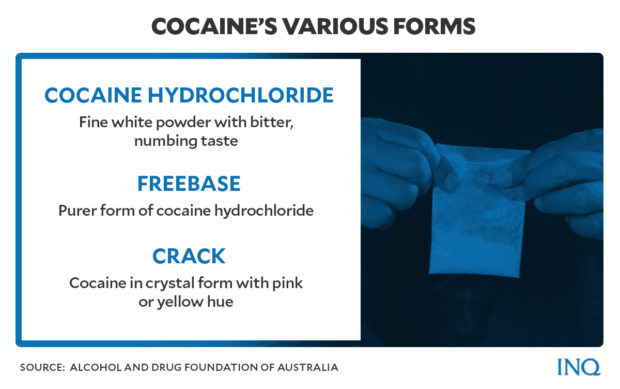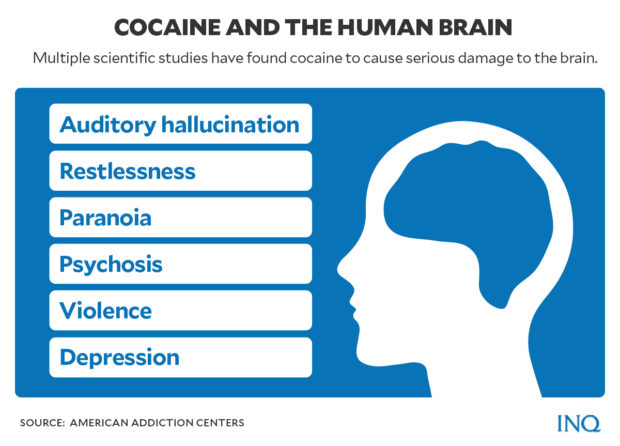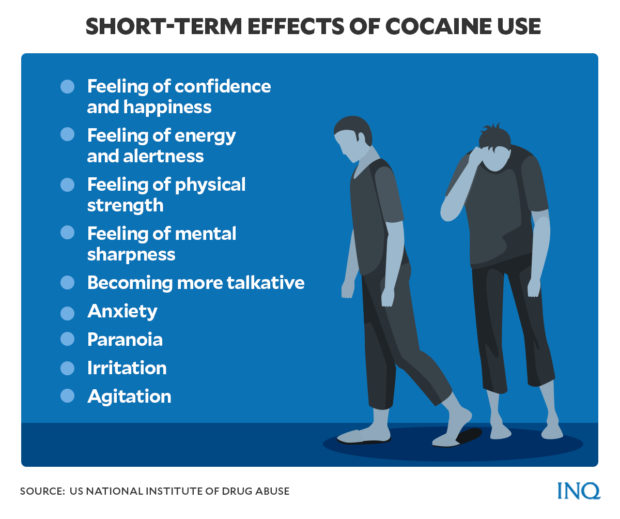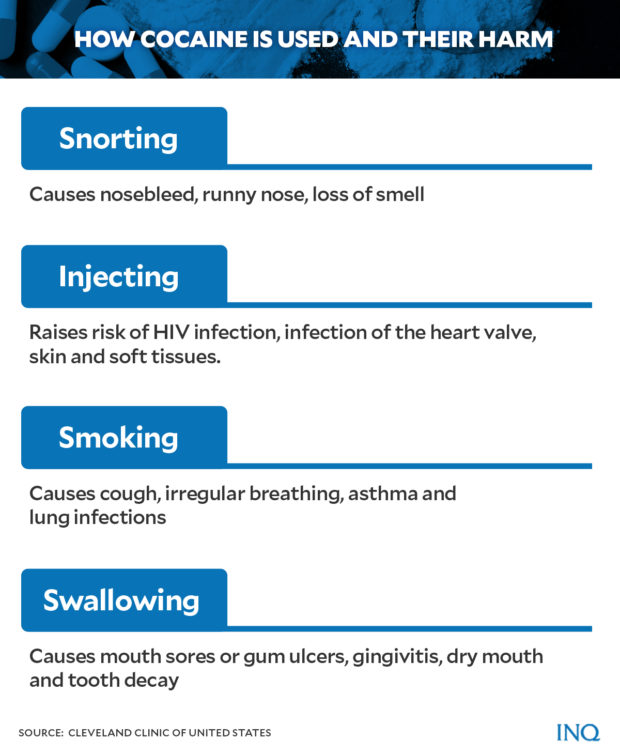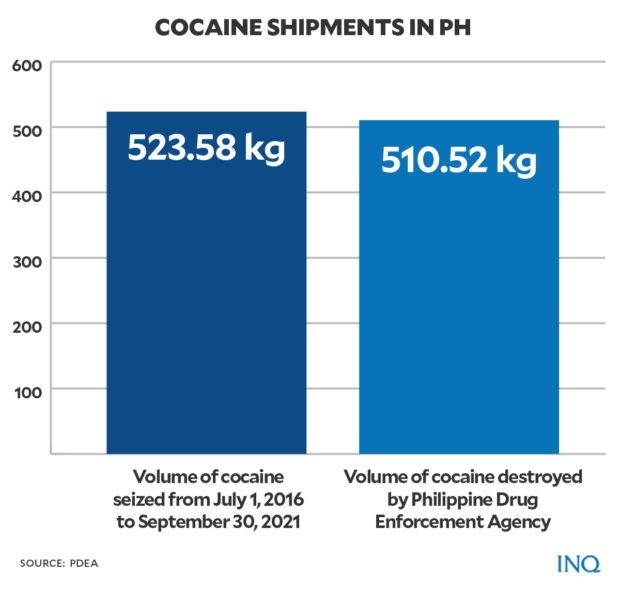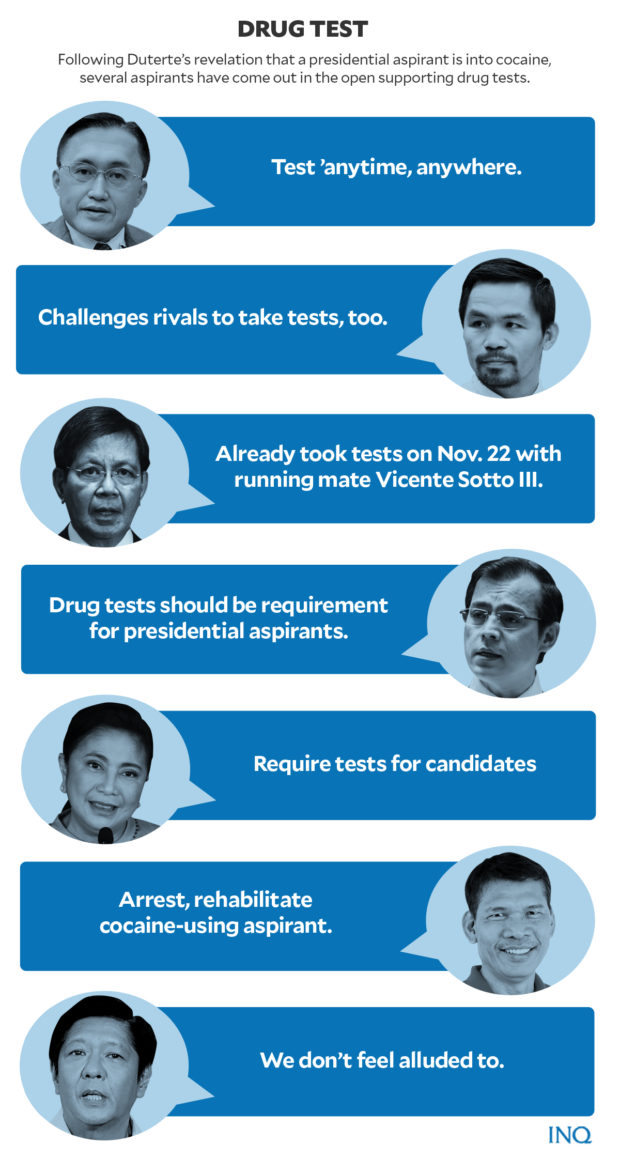Cocaine’s impact on the human body and PH polls
MANILA, Philippines—As the country prepares to elect its next leader, President Rodrigo Duterte made remarks that could shake up the presidential race.
On Nov. 18, a few days after a confusing and surprising week of political developments due to the withdrawal of candidacies and substitutions, Duterte claimed that a presidential aspirant is using illegal drugs—specifically cocaine.
READ: Dutertes, Marcoses: Curtains rise on politics unprecedented in PH
What seemed to be a revelation turned out to be a blind item since the President didn’t name names though dropping broad hints—the aspirant comes from a prominent and wealthy political family made famous by its patriarch.
“There’s even a presidential candidate using cocaine. A candidate is doing cocaine…from a rich family,” Duterte said in a speech.
Article continues after this advertisementREAD: Duterte claims a presidential aspirant does cocaine
Article continues after this advertisementDuterte likewise questioned the character of the candidate he was referring to.
“And he is a very weak leader—his character—except for the name. The father [was], but him? What has he accomplished?”
“He may win hands down. OK. If that is what the Filipino wants, go ahead, as long as you know,” the President said.
READ: Duterte: There’s a cocaine user running for president
Speculations also flew fast and wide on who Duterte was referring to.
It has also pushed some of the aspirants to speak up and clear their names.
In this article, INQUIRER.net will try to shed light on cocaine—a very harmful and addictive substance—its dangerous impact on the human body, the enormity of the cocaine trade worldwide and its perceived impact on Philippine elections.
Closer look
Cocaine, according to the Philippine Drug Enforcement Agency (PDEA), is a very addictive illegal stimulant that comes from the leaves of the coca plant, also called Erythroxylum coca, a shrub native to South America.
This illegal drug—which can be snorted, smoked, or dissolved and injected into a vein—speeds up messages traveling between the brain and body.
According to the Alcohol and Drug Foundation (ADF), an organization based in Australia, the leaf extract from the coca bush is often processed to produce three different forms of cocaine:
- Cocaine hydrochloride: characterized as a fine white powder with a bitter, numbing taste. “Cocaine hydrochloride is often mixed, or ‘cut’, with other substances such as lidocaine, talcum powder, or sugar to dilute it before being sold,” the ADF said.
- Freebase: a purer form of cocaine hydrochloride.
- Crack: in crystal form, which the ADF said could range from white or cream to transparent with a pink or yellow hue. Unlike the other two forms, this kind may contain impurities.
The United State’s National Institute of Drug Abuse (NIDA) explained that while cocaine can be used by health care providers for valid medical purposes—including local anesthesia for some surgeries—recreational use of cocaine is illegal.
“As a street drug, cocaine looks like a fine, white, crystal powder. Street dealers often mix it with things like cornstarch, talcum powder, or flour to increase profits.” the NIDA said.
“They may also mix it with other drugs such as the stimulant amphetamine, or synthetic opioids, including fentanyl. Adding synthetic opioids to cocaine is especially risky when people using cocaine don’t realize it contains this dangerous additive,” it added.
“Cocaine causes an intense flood of chemicals in the brain’s ‘pleasure’ or ‘reward’ pathway—essentially short-circuiting what would normally only be stimulated, or roused, by pleasurable life events,” the Cleveland Clinic said.
When this brain circuit is overloaded due to cocaine use, it causes changes in the brain which makes a person think that nothing would be pleasurable without the drug—a sign of cocaine addiction.
The illegal use of cocaine could lead to a series of more serious and life-threatening side effects, according to medical experts.
Dangerous impact of cocaine
The NIDA listed some serious immediate physical and mental effects of cocaine use including irritability, anxiety, increased temperature, increased heart rate, high blood pressure, and possible death.
Meanwhile, short-term effects, according to the ADF, include making a person:
- feel increased confidence and happiness
- feel energetic and alert
- feel physically strong
- feel mentally sharp
- more talkative
- anxious
- paranoid
- irritable and agitated
Other short-term effects are headaches, dizziness, dry mouth, dilated pupils, high blood pressure, high body temperature, rapid heartbeat and breathing, increased sex drive, insomnia, and indifference to pain.
Depending on how the cocaine is used, there are different harmful long-term effects to a person, said the Cleveland Clinic.
Snorting cocaine: nosebleeds, runny nose, loss of smell, hole in the nasal septum, hole in the roof of the mouth, and difficulty or issues in swallowing.
Injecting cocaine: increased risk of IV-related viruses from shared needles like hepatitis C and HIV or AIDS; vein collapse and scarring; infections in the heart valve, skin, and soft tissue.
Smoking cocaine: cough, irregular breathing, asthma, higher risk of lung infections including pneumonia and bronchitis.
Cocaine absorption through gums in the mouth: mouth sores or ulcers on the gums including the underlying bone, receding gums, chronic gingivitis, dry mouth and tooth decay.
Cocaine addiction can also lead to severe weight loss and malnourishment, movement disorders, intestinal death and rupture caused by constricted blood vessels or lack of oxygen to the intestinal tract.
Cocaine and the human brain
The American Addiction Centers (AAC) said cocaine can cause long-term damage to mental health, which could be observed in the form of mood or emotional disturbances.
“Because the drug directly interferes with dopamine being reabsorbed by neurons, one of the symptoms of a cocaine comedown is serious depression,” the US-based health care company said.
These serious long-term changes to mood, mental health, and cognitive function brought by cocaine abuse include:
- auditory hallucinations
- restlessness
- paranoia or extreme and unreasonable distrust of others
- psychosis
- unpredictable, violent, or aggressive behavior
- depression
- Long-term cocaine addiction can also lead to damages to the physical structure of the brain.
Aside from damaged lining of the veins and arteries, blood clots in the brain, seizures, a study conducted by scientists from the University of Cambridge showed that the brains of people who abused cocaine but had no previous history of drug abuse rapidly deteriorate.
“The group found that the average brain normally loses 1.69 milliliters of gray matter per year,” AAC said. “However, people who had abused cocaine in the past, or who were currently cocaine-dependent, doubled the rate of gray matter loss, for an average of 3.08 milliliters per year,” AAC added.
Another study conducted by Johns Hopkins University found that cocaine may push brain cells to “cannibalize themselves.”
“The study describes cocaine triggering autophagy in neurons in mice, or the process of the cells eating themselves from the inside out,” AAC detailed.
“The cells throw out useful resources during metabolism, leading to a stress reaction of cannibalizing other internal cell structures,” it added.
Confiscated and destroyed
Data from PDEA showed that from July 1, 2016 to September 30, 2021, the government has seized a total of 523.58 kilograms of cocaine in the country.
The anti-illegal drug agency has also destroyed 510.52 kilograms of cocaine during the same period.
According to the United Nations Office on Drugs and Crime (UNODC), cocaine trafficking in Asia from 2015 to 2019 was mostly carried out by air.
However, in 2018, most cocaine that entered the Philippines was brought by ships.
In 2019, the Philippine National Police (PNP) reported that P1.14 billion worth—or 217.3 kilos of cocaine—was retrieved off the country’s waters from February to April that year.
This was after bricks of cocaine were spotted floating on coastal waters in different parts of the country.
Based on the then-street value of cocaine in the country, each kilo seized was worth P5 million, according to the Dangerous Drugs Board (DDB).
READ: ‘Floating cocaine’ breaches P1-B mark in 2 months
Then-PDEA chief Aaron Aquino said the floating cocaine found along the country’s eastern seaboard could have come from a Colombian drug cartel.
Duterte said in February 2019 that the cocaine packages confirmed the presence of big-time international drug cartels in the country.
“The news that you hear every day about the floating drugs all around the country is that really we have confirmed that Sinaloa and Medellin cartels are in the trade now. It has always been cocaine from Mexico,” Duterte said.
The Sinaloa drug cartel is a big-time drug syndicate in Mexico while the Medellin cartel is a Colombian syndicate founded by the late drug kingpin Pablo Escobar.
Cocaine and the upcoming polls
The reason why Duterte made such a revelation linked to a certain aspirant?
According to the PDP-Laban wing led by Energy Secretary Alfonso Cusi, the President just wanted to help voters “carefully discern” their choices in next year’s elections.
“President Duterte’s point is simple. He wants the voters to carefully discern their choice of the country’s next leader,” the political party said in a statement.
“That person should be able to guarantee continuity of the administration’s programs, not just by mere lip service, but by concrete actions,” the party added.
READ: Duterte only wants voters to discern choice for president — Cusi’s PDP-Laban wing
PNP chief Gen. Dionardo Santos said on Nov. 20 that the PNP Drug Enforcement Group (PDEG) has been tasked with working on an investigation of the presidential aspirant who uses cocaine.
READ: PDEG ‘tasked to work on’ Duterte’s info on ‘cocaine user’ running for president
On Monday (Nov. 22), Sen. Ronald “Bato” dela Rosa said he believed Duterte will soon reveal the identity of the presidential candidate.
“The President does not need to be told that. He will later reveal the identity of that person,” the senator said.
READ: Duterte will soon reveal identity of cocaine-using presidential bet — dela Rosa
Dela Rosa, who previously served as PNP chief, said he is not sure if the information Duterte has is a new or old one.
Several presidential aspirants have already issued statements following Duterte’s revelation.
Sen. Christopher “Bong” Go, Duterte’s closest confidante, said he was willing to voluntarily undergo a drug test “anytime, anywhere.”
Sen. Manny Pacquiao has likewise expressed willingness to be tested for illegal drug use. He also challenged his rivals in the presidential race to do the same.
Sen. Panfilo Lacson and his running mate Senate President Vicente “Tito” Sotto III on Nov. 22 already got tested at the PDEA. Both of them tested negative for illegal drugs.
READ: Lacson, Sotto test negative for cocaine, other drugs
Prior to this, Lacson had said he is “1,000 percent sure” that he was not the aspirant Duterte was referring to.
“I have never been addicted to drugs all my life, so I have no problem with that. In fact, we should all undergo random testing to make it more credible. I understand drug toxins may dissipate after 72 hours,” the senator said.
READ: Lacson ‘1,000% sure’ Duterte wasn’t referring to him about aspirant using cocaine
Veteran labor leader Ka Leody de Guzman, on the other hand, has dared the President to order an investigation into the cocaine-using presidential aspirant.
“Duterte surely knows who is the cocaine supplier of that candidate. He should focus on that so he could make an arrest and stop it,” De Guzman said.
“Instead of spreading gossip, arrest that candidate and then have him rehabilitated,” he added.
The camp of former Sen. Ferdinand “Bongbong” Marcos Jr. distanced itself from the allegations.
“We don’t feel alluded to. We’re just concentrating on what we’re doing,” said Victor Rodriguez, Marcos’ chief of staff.
READ: Marcos Jr.’s rep: ‘We don’t feel alluded to’ by Duterte’s cocaine user claim vs bet
Amid the controversy, the Commission on Election (Comelec) spokesperson James Jimenez said the use of illegal drugs, such as cocaine, is not among the grounds to disqualify a candidate from running for public office.
“Substance abuse is not among the disqualifications provided for by law,” said Jimenez.
“In any case, the Comelec did try to require candidates to submit a negative drug test several elections ago,” he added.
READ: A candidate’s substance abuse is not ground for disqualification — Comelec
TSB

